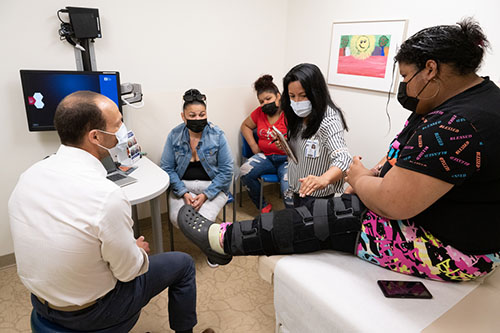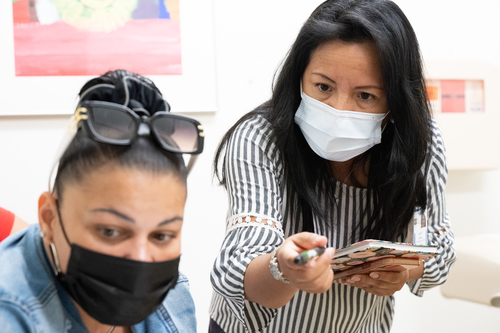
Lucy Miller is a full-time Spanish language interpreter at Akron Children’s Mahoning Valley campus.
Providing language access services to patients who have limited English proficiency is essential to delivering culturally competent care that meets each patient’s unique social, cultural and communication needs.
“Having an ill child is already stressful for any parent. Not fully understanding or being able to communicate effectively about their child’s illness adds to that stress,” said Roula Braidy, manager of Akron Children’s Language and Special Access Services. “In order to provide culturally competent care, we have to speak their language.”
To better meet the needs of patients, we’ve added two full-time Spanish language interpreters to our regional site in Lorain County and on our Beeghly campus in the Mahoning Valley. Ximena Siques is at our Amherst Health Center and Lucy Miller is on our Beeghly campus. They are serving a growing number of Spanish-speaking families, including a large population of patient families from Puerto Rico.
“We saw a need in these communities to provide Spanish-language interpreters who are dedicated to these regional locations,” said Braidy.
“Having access to an interpreter onsite has been very well-received by both staff and patients,” said Miller. “We also provide interpreters over iPads and the Language Line, which are great resources to help break language and cultural barriers at any time we have a non-English speaking family.”
When patients are face-to-face with an interpreter, they are more apt to share information that can be used to improve their experience or identify other needs that can be addressed.
“Along with being interpreters, we help them connect with social work services for other concerns, such as transportation issues, billing problems or how to access MyChart,” said Siques, noting it is also easier to help patients make appointments for specialty care or rehab services when they are face-to-face.

Lucy Miller (right) provides Spanish language interpretive services for a patient family.
“Talking to the schedulers over the phone and answering seemingly simple questions can be difficult, even if patients have some English proficiency. For example, they may not know their child’s date of birth because they were assigned a different date when they came to the U.S.,” said Braidy.
While the use of qualified interpreters is required by law and our own hospital policies, it is also the right thing to do.
“Effective communication with patient families who have limited English proficiency is vitally important, such as making sure they know how to give medications to their child,” said Braidy. “Beyond going the extra mile to deliver an exceptional patient experience, the use of qualified interpreters and interpreting services helps to ensure the best possible outcomes for our patients.”
Learn more about our Translation and Language Access Services.










